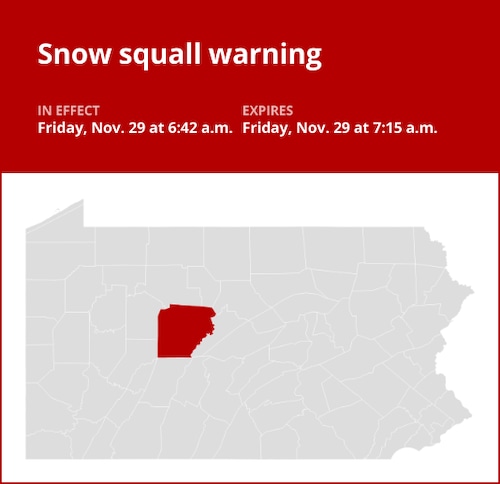The National Weather Service issued a snow squall warning for Clearfield County on Friday at 6:42 a.m., which was in force until 7:15 a.m.
According to the meteorological service, “a dangerous snow squall was located over Rockton at 6:41 a.m., moving east at 25 mph.” “For those driving on Interstate 80, this includes areas between the Dubois and Woodland exits, specifically from mile markers 97 to 121.”
DuBois, Clearfield, Sandy, Hyde, Plymptonville, Rockton, S.B. Elliot State Park, Falls Creek, Treasure Lake, Clearfield-Lawrence Airport, and Penn State Dubois are among the places affected by the warning.
“Travel will become difficult and potentially dangerous within minutes,” the weather agency said. “Think about avoiding or postponing travel until the snowstorm has passed where you are. If you have to travel, be especially careful and give yourself more time. Accidents may result from sloppy roads and abrupt changes in visibility. When a snowstorm hits a highway, there is nowhere safe to go. In whiteout situations, visibility and traction are instantly compromised, making it difficult or impossible to reduce speed and avoid stopped cars. Before the snow squall hits, postpone your trip or get off the roadway safely.
The snow squall guide: Preparation and caution on winter roads
What are snow squalls?
Strong cold fronts are frequently linked to snow squalls, which are severe winter weather conditions. Even in the absence of a significant winter storm, they can swiftly cover roads with snow and ice. Even while these squalls usually last less than an hour and only produce light snow accumulation, their restricted visibility, strong winds, and quickly falling temperatures can make them dangerous. Unfortunately, in the past, these circumstances have played a role in catastrophic and occasionally fatal road accidents.
Understanding snow squalls vs. Snowstorms
The length of the event distinguishes a snowstorm from a snow squall. Typically lasting between 30 and 60 minutes, snow squalls are incredibly powerful. Days or even hours may pass during a snowfall.
Snow squall warnings
Like warnings for tornadoes or severe thunderstorms, snow squalls are quickly issued for specific locations. They provide vital, locally relevant information that can save lives. If there is a snow squall warning in your location, it is recommended to wait until the squall passes before driving.
Actions to take
When a snow squall warning is issued, people should heed the weather service’s instructions, which include the following crucial steps:
Avoid or postpone travel: If your area is under a snow squall warning, stay indoors or wait for the squall to pass through before driving. During a snowstorm, there is absolutely nowhere safe to drive on the roadway.
Decrease speed and improve visibility: If you are already traveling and won’t be able to get off the road in time, slow down and activate your headlights and hazard lights.
Keep a safe distance: Make sure there is enough space between your car and the one in front of you. In order to account for decreased vision and the possibility of unpredictable road conditions during a squall, this precaution is crucial.
Steer clear of quick braking: Sudden braking can cause a vehicle to lose control in icy and slippery conditions. To reduce the chance of sliding or producing a chain reaction crash, it is safer to reduce your speed gradually.
Winter weather safety advice: Check out the weather service’s Winter Weather Safety page for advice on how to keep safe before, during, and after winter weather.
Get your car ready:Make sure your car is winter-ready before you hit the road this winter by checking the tires, brakes, lights, and making sure all the fluids are at the right levels. A well-maintained car can handle the rigors of winter roads more easily.
Essentials for your car’s emergency kit: Always keep a first-aid kit, blankets, non-perishable food, water, a flashlight, and other essentials in your car’s emergency kit. For better tire traction, add jumper cables, flares or a reflective triangle, ice scraper, a map, a car cell phone charger, and cat litter or sand. Should you experience an emergency or unplanned breakdown while traveling, these supplies can be quite helpful.
In conclusion, putting one’s own safety first and following the weather service’s advice can greatly reduce dangers when a snow squall warning is in effect. People can travel through these winter dangers with more assurance and security if they are aware of them, plan beforehand, and remain alert.
United Robots offers a service called Advance Local Weather Alerts that gathers the most recent information from the National Weather Service using machine learning.
Note: Every piece of content is rigorously reviewed by our team of experienced writers and editors to ensure its accuracy. Our writers use credible sources and adhere to strict fact-checking protocols to verify all claims and data before publication. If an error is identified, we promptly correct it and strive for transparency in all updates, feel free to reach out to us via email. We appreciate your trust and support!

